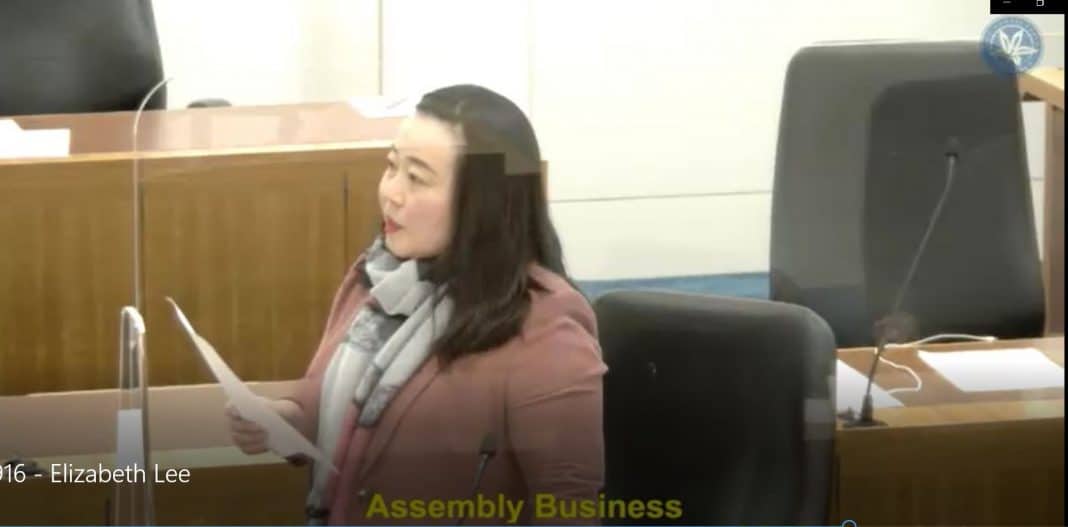A select committee will examine the ACT Government’s response to the COVID-19 outbreak, focusing on health and economic recovery, but also its lasting impact on education, housing, transport, and other policy areas.
Opposition leader Elizabeth Lee, the motion’s proponent, hoped the committee would give the community – businesses, educators, and community groups – an opportunity to have their say.
“Our community deserves answers from the Chief Minister, his cabinet, and government officials,” she said.
The ACT was in the midst of the greatest health and economic risk it had ever faced, Ms Lee stated. Small businesses had closed their doors; Canberrans had lost their jobs; thousands had faced weeks in quarantine; and hundreds had contracted the virus. Canberrans, like other Australians, had handed their governments unprecedented powers to protect them and their livelihoods.
“This once-in-a-generation pandemic has required governments to act quickly and decisively to save lives,” Ms Lee said.
“These are extraordinary times, and we have put our trust, our confidence, and goodwill in the decision-makers and political leaders of our city to make those decisions.”
Pandemic select committees on government responses to COVID-19 have been established in many legislatures across the country, including NSW, Victoria, in the ACT last year, and in the Australian Senate, Ms Lee stated.
The ACT Human Rights Commission has also called for a select committee to be established. In a letter to Ms Lee, Mr Barr, and Greens leader Shane Rattenbury, it argued: “Emergency power exercised by government must continue to be carefully monitored, so that any disproportionate or inadvertent impacts are quickly identified and corrected. It is equally if not more important now in the current lockdown that emergency measures and other effects are accountable to public scrutiny interrogation and debate by the Assembly.”
Ms Lee said while the Liberals largely supported the ACT Government’s response to the outbreak, that did not mean they had gotten or were getting everything right.
“It is more important than ever there is appropriate scrutiny over the government’s response to COVID-19,” she said. “Now is not the time to diminish government scrutiny.”
After Chief Minister Andrew Barr’s announcement this week of four more weeks of lockdown, many Canberrans wanted answers, thousands of Canberrans were left wondering whether their government had a plan at all, Ms Lee claimed.
“Many Canberrans are seeking answers. When will they get a plan that will see us safely transition out of lockdown?
“What milestones need to be reached with vaccinations before concrete details will be released for the resumption of businesses that have been shut from day one of lockdown?
“When, and how, and subject to what, will schools return to classroom teaching? What are the conditions or milestones or achievements that need to be met before we can meet other households?
“What will these vaccination rates mean for Canberrans? What will happen when we reach 70, 80, 90 per cent double doses? When borders do open up, what does the future of quarantine look like in the ACT? Will we start getting boosters after a certain percentage of the population has received double doses?”
The response of the ACT bureaucracy – “the best and the not-so-awesome” – must be highlighted to inform future service delivery, said Giulia Jones, Shadow Minister for Health and Wellbeing.
Questions remained about the health and safety of staff, and preparation for lockdown over the previous 18 months, from the lack of fit-testing of protective masks for paramedics and nurses in hospital COVID-19 wards, to poor communication with people in quarantine, and financial assistance and mental health care for business.
Greens backbencher Andrew Braddock backed the proposal, albeit with amendments. Ms Lee had proposed the committee should comprise two government and two opposition members; Mr Braddock changed it to three members, one from each party, in line with practice for standing committees. This, he said, would prevent the deadlock of a tied vote.
“Decision-makers have an unprecedented level of control over our lives,” Mr Braddock said. “This is all for the greater good … However, it would be a disservice to the Canberra community who have sacrificed so much to not ensure there is continued scrutiny of these decisions. … The more government decisions impact lives, the more scrutiny there should be.”
The Labor party supported Mr Braddock’s amendments. Health Minister Rachel Stephen-Smith resented the suggestion that the government had not been transparent; she, Mr Barr, and health officials gave daily press conferences and interviews on radio, and had been open about their decisions.
“Any suggestion that we’re hiding anything or that we’re not being transparent is patently ridiculous,” she said. “We are very transparent; we absolutely welcome scrutiny.”
The ACT Government had made a commitment to its citizens that it would not make promises it could not keep, Ms Stephen-Smith stated.
“The future of this outbreak is unpredictable,” she said. “What we were clear about was that we knew that we needed to extend this lockdown, and we knew it was going to have to likely be for four weeks. So we thought it was really important that we told people that.
“But the Chief Minister has also outlined what the steps beyond that are likely to look like, and they’re very likely to be similar to the way that we came out of lockdown last year.
“So any suggestion that that hasn’t been talked about significantly and publicly is absolutely untrue.”



